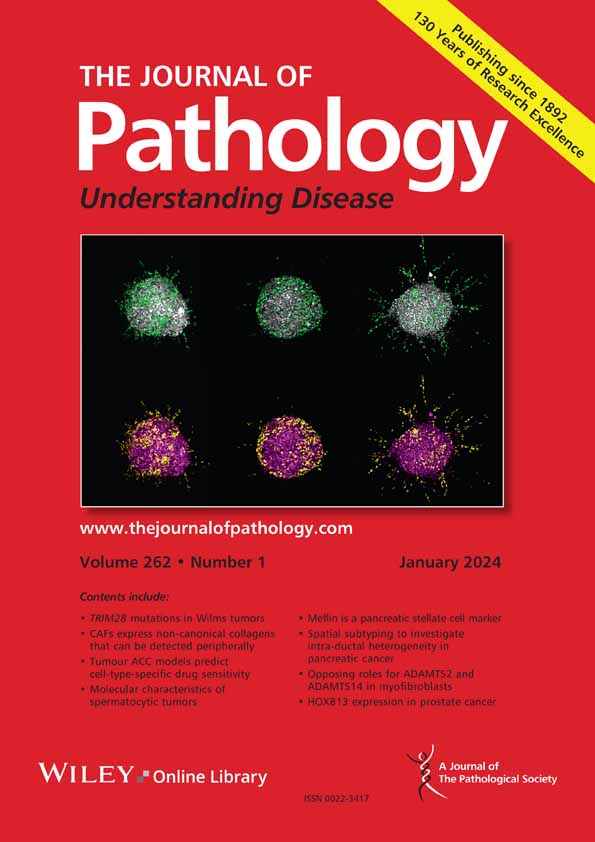Yongsong Yong, Richard Demmler, Bisan Abdalfatah Zohud, Qi Fang, Tong Zhang, Yonghua Zhou, Katja Petter, Christian Flierl, Tobias Gass, Carol I Geppert, Susanne Merkel, Vera S Schellerer, Elisabeth Naschberger, Michael Stürzl
下载PDF
{"title":"AMIGO2 是转移性结肠癌中癌症相关成纤维细胞的特征,可诱导释放旁分泌型活性致癌分泌物。","authors":"Yongsong Yong, Richard Demmler, Bisan Abdalfatah Zohud, Qi Fang, Tong Zhang, Yonghua Zhou, Katja Petter, Christian Flierl, Tobias Gass, Carol I Geppert, Susanne Merkel, Vera S Schellerer, Elisabeth Naschberger, Michael Stürzl","doi":"10.1002/path.6363","DOIUrl":null,"url":null,"abstract":"<p>Secretomes of cancer-associated fibroblasts (CAFs) in colorectal cancer (CRC) contribute to malignancy. Detailed knowledge is available on the components and functions of CAF secretomes. Little is known about the regulation of CAF secretomes. Here, we searched for receptor-like membrane-bound molecules in CAFs, which may regulate the production and release of tumor-activating secretomes. The adhesion molecule with Ig-like domain 2 (AMIGO2) was significantly upregulated in cultivated CAFs compared to normal tissue-associated fibroblasts (NAFs), and this was confirmed in patient-derived tissues. AMIGO2 expression was low or absent in healthy colon, significantly increased in fibroblasts of primary CRC, and highest in the stromal tissues of CRC-derived liver metastases. AMIGO2 expression in CAFs correlated with a higher T-category, increased lymph node metastasis, progressed tumor stages and was associated with reduced survival in different cohorts of CRC patients. Interestingly, AMIGO2 expression was induced by transforming growth factor-β and higher in female patients, who exhibit a more aggressive disease course. In functional studies, conditioned media of NAFs with experimentally induced AMIGO2 overexpression enhanced proliferation and migration of different CRC tumor cells, while siRNA-mediated inhibition of AMIGO2 in CAFs attenuated these effects. Accordingly, therapeutic inhibition of the receptor-like AMIGO2 protein in CRC CAFs could prevent tumorigenic secretomes in CRC. © 2024 The Author(s). <i>The Journal of Pathology</i> published by John Wiley & Sons Ltd on behalf of The Pathological Society of Great Britain and Ireland.</p>","PeriodicalId":232,"journal":{"name":"The Journal of Pathology","volume":"265 1","pages":"14-25"},"PeriodicalIF":5.6000,"publicationDate":"2024-11-11","publicationTypes":"Journal Article","fieldsOfStudy":null,"isOpenAccess":false,"openAccessPdf":"https://www.ncbi.nlm.nih.gov/pmc/articles/PMC11638658/pdf/","citationCount":"0","resultStr":"{\"title\":\"AMIGO2 characterizes cancer-associated fibroblasts in metastatic colon cancer and induces the release of paracrine active tumorigenic secretomes\",\"authors\":\"Yongsong Yong, Richard Demmler, Bisan Abdalfatah Zohud, Qi Fang, Tong Zhang, Yonghua Zhou, Katja Petter, Christian Flierl, Tobias Gass, Carol I Geppert, Susanne Merkel, Vera S Schellerer, Elisabeth Naschberger, Michael Stürzl\",\"doi\":\"10.1002/path.6363\",\"DOIUrl\":null,\"url\":null,\"abstract\":\"<p>Secretomes of cancer-associated fibroblasts (CAFs) in colorectal cancer (CRC) contribute to malignancy. Detailed knowledge is available on the components and functions of CAF secretomes. Little is known about the regulation of CAF secretomes. Here, we searched for receptor-like membrane-bound molecules in CAFs, which may regulate the production and release of tumor-activating secretomes. The adhesion molecule with Ig-like domain 2 (AMIGO2) was significantly upregulated in cultivated CAFs compared to normal tissue-associated fibroblasts (NAFs), and this was confirmed in patient-derived tissues. AMIGO2 expression was low or absent in healthy colon, significantly increased in fibroblasts of primary CRC, and highest in the stromal tissues of CRC-derived liver metastases. AMIGO2 expression in CAFs correlated with a higher T-category, increased lymph node metastasis, progressed tumor stages and was associated with reduced survival in different cohorts of CRC patients. Interestingly, AMIGO2 expression was induced by transforming growth factor-β and higher in female patients, who exhibit a more aggressive disease course. In functional studies, conditioned media of NAFs with experimentally induced AMIGO2 overexpression enhanced proliferation and migration of different CRC tumor cells, while siRNA-mediated inhibition of AMIGO2 in CAFs attenuated these effects. Accordingly, therapeutic inhibition of the receptor-like AMIGO2 protein in CRC CAFs could prevent tumorigenic secretomes in CRC. © 2024 The Author(s). <i>The Journal of Pathology</i> published by John Wiley & Sons Ltd on behalf of The Pathological Society of Great Britain and Ireland.</p>\",\"PeriodicalId\":232,\"journal\":{\"name\":\"The Journal of Pathology\",\"volume\":\"265 1\",\"pages\":\"14-25\"},\"PeriodicalIF\":5.6000,\"publicationDate\":\"2024-11-11\",\"publicationTypes\":\"Journal Article\",\"fieldsOfStudy\":null,\"isOpenAccess\":false,\"openAccessPdf\":\"https://www.ncbi.nlm.nih.gov/pmc/articles/PMC11638658/pdf/\",\"citationCount\":\"0\",\"resultStr\":null,\"platform\":\"Semanticscholar\",\"paperid\":null,\"PeriodicalName\":\"The Journal of Pathology\",\"FirstCategoryId\":\"3\",\"ListUrlMain\":\"https://onlinelibrary.wiley.com/doi/10.1002/path.6363\",\"RegionNum\":2,\"RegionCategory\":\"医学\",\"ArticlePicture\":[],\"TitleCN\":null,\"AbstractTextCN\":null,\"PMCID\":null,\"EPubDate\":\"\",\"PubModel\":\"\",\"JCR\":\"Q1\",\"JCRName\":\"ONCOLOGY\",\"Score\":null,\"Total\":0}","platform":"Semanticscholar","paperid":null,"PeriodicalName":"The Journal of Pathology","FirstCategoryId":"3","ListUrlMain":"https://onlinelibrary.wiley.com/doi/10.1002/path.6363","RegionNum":2,"RegionCategory":"医学","ArticlePicture":[],"TitleCN":null,"AbstractTextCN":null,"PMCID":null,"EPubDate":"","PubModel":"","JCR":"Q1","JCRName":"ONCOLOGY","Score":null,"Total":0}
引用次数: 0
引用
批量引用



 求助内容:
求助内容: 应助结果提醒方式:
应助结果提醒方式:


